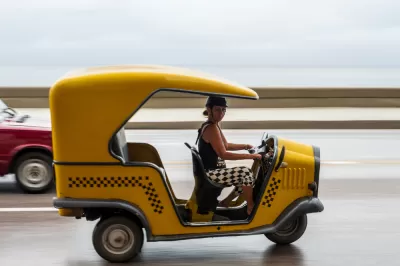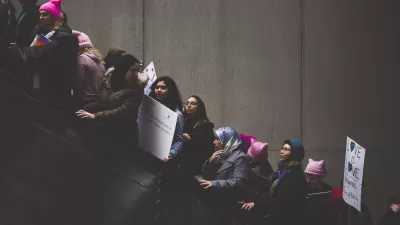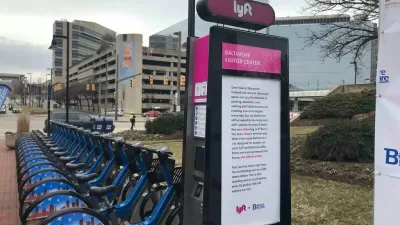In Mexico, one popular app illustrates the feasibility and efficacy of women-only transportation models.

In recent years, a variety of strategies have been proposed to improve women's safety during travel: Women-only buses and metro cars. Women-only taxis. A panic button in ride-hailing cars. And finally: the women-only ride-hailing app. In CityLab, Maya Kroth profiles the rise of Laúdrive, a women-only ride-hailing app in Mexico that skyrocketed in popularity after the murder of a woman by her ride-hailing driver this year.
Women-only apps have struggled to break into the duopolized ride-hailing market, faced with the same policy challenges plaguing dominant companies on top of the perils typical to any specialized startup. The model has appeared, and then declined, in several countries; in the U.S., it could be considered gender-based discrimination. In fact, researcher Alex Rosenblat tells CityLab that the subset's very existence is an indictment of the industry as a whole.
Rosenblat says the demand for women-only services points to a flaw in the current ride-hailing model, which relies on a user-ratings system to foster trust between strangers.
“Customers are expected to perform this task of flagging errant behavior,” she says. “Neither drivers nor passengers are paid for that kind of work, but the success of safety at scale implies the free labor that people are willing to perform. It’s clear that ratings don’t solve everything.”
And while strategies that isolate women can materially improve safety outcomes on a trip-by-trip basis, they don't address the larger question of women's ability to move and exist freely in the public realm. Mexico is beginning to devote attention to this issue, Kroth reports, but it remains a defining characteristic of cities around the world.
FULL STORY: In Mexico, Momentum Builds for Women-Only Ride-Hailing Apps

Planetizen Federal Action Tracker
A weekly monitor of how Trump’s orders and actions are impacting planners and planning in America.

Chicago’s Ghost Rails
Just beneath the surface of the modern city lie the remnants of its expansive early 20th-century streetcar system.

San Antonio and Austin are Fusing Into one Massive Megaregion
The region spanning the two central Texas cities is growing fast, posing challenges for local infrastructure and water supplies.

Since Zion's Shuttles Went Electric “The Smog is Gone”
Visitors to Zion National Park can enjoy the canyon via the nation’s first fully electric park shuttle system.

Trump Distributing DOT Safety Funds at 1/10 Rate of Biden
Funds for Safe Streets and other transportation safety and equity programs are being held up by administrative reviews and conflicts with the Trump administration’s priorities.

German Cities Subsidize Taxis for Women Amid Wave of Violence
Free or low-cost taxi rides can help women navigate cities more safely, but critics say the programs don't address the root causes of violence against women.
Urban Design for Planners 1: Software Tools
This six-course series explores essential urban design concepts using open source software and equips planners with the tools they need to participate fully in the urban design process.
Planning for Universal Design
Learn the tools for implementing Universal Design in planning regulations.
planning NEXT
Appalachian Highlands Housing Partners
Mpact (founded as Rail~Volution)
City of Camden Redevelopment Agency
City of Astoria
City of Portland
City of Laramie





























